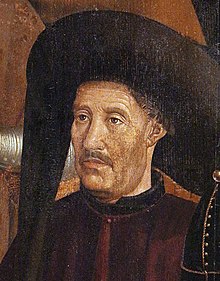Prince Henry the Navigator
| Prince Henry the Navigator | |
|---|---|
| Duke of Viseu | |

Infante Henrique; St. Vincent Panels
|
|
| Born |
4 March 1394 Porto, Portugal |
| Died | 13 November 1460 (aged 66) Sagres, Portugal |
| Burial | Batalha Monastery |
| House | Aviz |
| Father | John I of Portugal |
| Mother | Philippa of Lancaster |
| Religion | Roman Catholicism |
Infante D. Henrique of Portugal, Duke of Viseu (4 March 1394 – 13 November 1460), better known as Prince Henry the Navigator (Portuguese: Infante Dom Henrique, o Navegador), was an important figure in 15th-century Portuguese politics and in the early days of the Portuguese Empire. Through his administrative direction, he is regarded as the main initiator of what would be known as the Age of Discoveries. Henry was the third child of the Portuguese king John I and responsible for the early development of Portuguese exploration and maritime trade with other continents through the systematic exploration of Western Africa, the islands of the Atlantic Ocean, and the search for new routes.
King John I was the founder of the House of Aviz. Henry encouraged his father to conquer Ceuta (1415), the Muslim port on the North African coast across the Straits of Gibraltar from the Iberian Peninsula. He learned of the opportunities from the Saharan trade routes that terminated there, and became fascinated with Africa in general; he was most intrigued by the Christian legend of Prester John and the expansion of Portuguese trade. Henry is regarded as the patron of Portuguese exploration.
Henry was the third surviving son of King John I and his wife Philippa, sister of King Henry IV of England. He was baptized in Porto, and may have been born there, probably when the royal couple was living in the city's old mint, now called Casa do Infante (Prince's House), or in the region nearby. Another possibility is that he was born at the Monastery of Leça do Bailio, in Leça da Palmeira, during the same residential passage of the royal couple in the city of Porto.
...
Wikipedia
